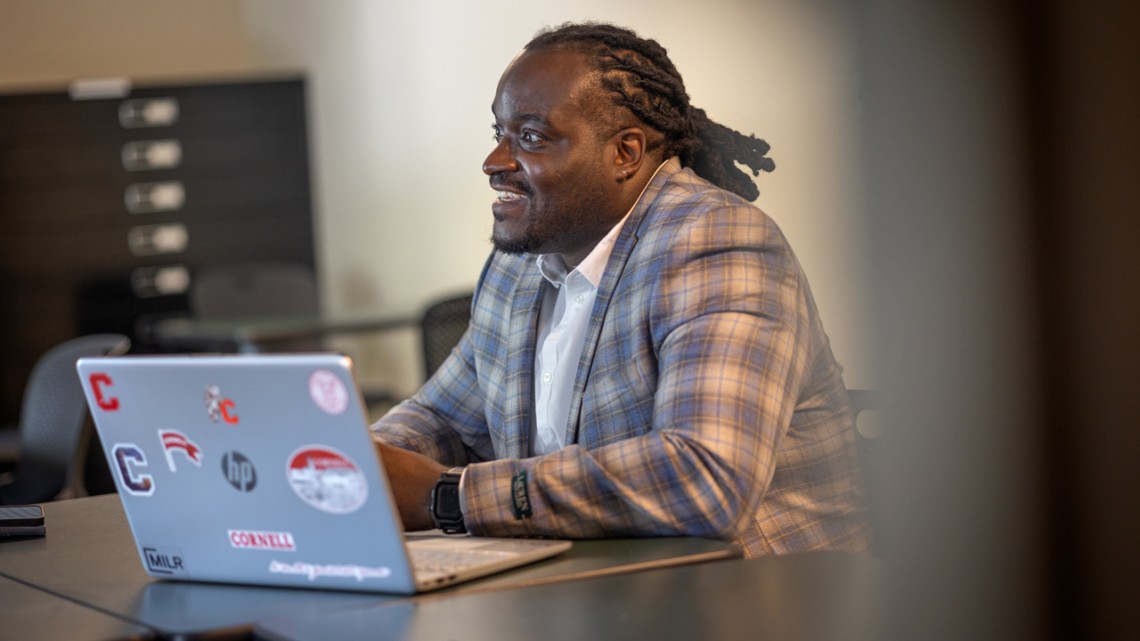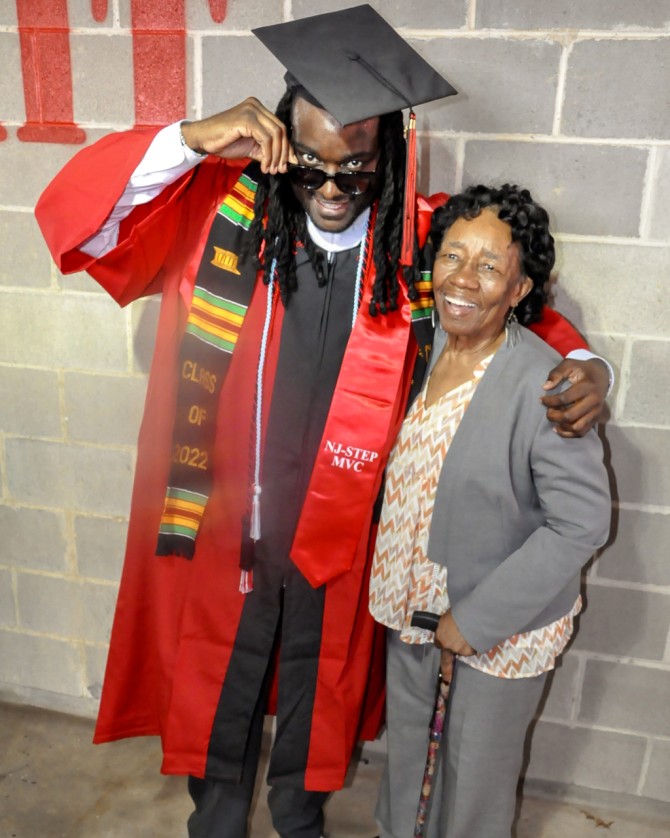
Master’s student Thomas Jones in the ILR School's Catherwood Library.
Master’s degree student persevered from prison to Ivy League
By Caitlin Hayes, Cornell Chronicle
In 2016, Thomas Jones was serving his second sentence in prison, parting ways with his 4-year-old son after visiting hours, when a switch flipped in his mind.
“I’ll never forget this – he looked up at me and said, ‘I want to go with you,’” Jones said. “I had to explain to him that I’m in prison. This is where people go when they don’t follow the rules. As he was leaving, he kept looking back, kept saying those words, ‘I want to come with you.’ It just tore my heart to pieces, and I was like, this can’t be my reality. That was my defining moment.”
Over the next five years, with the help of the New Jersey Scholarship and Transformative Education in Prisons initiative, Jones earned his associate’s degree while in a halfway house and, upon release, his bachelor’s degree, working full-time during the day and taking classes full-time at night. He earned enough money to rent a two-bedroom apartment for himself and his son – and, after excelling in his undergraduate studies, was accepted to the ILR School’s Master in Industrial and Labor Relations program. Jones relocated to Ithaca with his son, fiancé and stepson in 2022.
“You can’t even imagine, coming from incarceration, to even think that we’d end up here,” Jones said. “It’s been a blessing and a game-changer in so many ways.”
But Jones said he has not left his past behind. He wants to help and inspire others impacted by the criminal justice system, and to use the negative experiences – struggles with mental health and discrimination, especially – to make the workplace, via the human resources field, more equitable and empathetic.
To give back, Jones has worked with Tompkins Cortland Community College Extension to tutor and mentor people who have served time or had contact with the criminal justice system and who want to pursue education. He’s worked as a graduate research assistant for the ILR School’s Criminal Justice and Employment Initiative, and is on the board of directors for the Cornell Prison Education Program. Last May, he gave the commencement speech for inmates completing their degrees at the Elmira Correctional Facility.
Professionally, Jones hopes to cultivate diversity, equity and inclusion (DEI) in the workplace and serves as the ILR Graduate Student Association’s co-vice president for DEI. He wants to increase employment and leadership access for minorities and anyone who faces obstacles to employment and to make the workplace more hospitable to people of different backgrounds.
“People have so many different struggles that they don’t speak about,” Jones said.
Doing better
When Jones was 7, his parents – his mother, with a background in social work, and father, a veteran – started taking in emergency foster children in his hometown of Piscataway, New Jersey.
“They wanted to help those kids – but it exposed me and my siblings to a lot,” Jones said.
Drugs and violence, including foster children’s suicide attempts, became part of Jones’ life, and when he was 9, he was threatened at knifepoint by an older boy. After that, he started sleeping with a knife under his pillow.
“I’ve always lived in a constant state of anxiety and fear,” Jones said.
That anxiety followed Jones through his teenage years and into adulthood, as he lost peers to gun violence and his father was deployed to Iraq. When he and his friends went into high crime areas, he wanted to be able to protect himself.
That led to his first conviction of unlawful possession of a handgun at age 20; he was sentenced to three years in prison. His early exposure to the criminal justice system normalized the experience, he said.
“A lot of my friends were either in the juvenile justice system or serving time, and I would meet back up with them in prison,” Jones said. “It was like a reunion. Growing up the way I did, I was already conditioned in my mind that I would one day do time.”
Jones was released after a year for good behavior and attempted to go back to school at a local community college and to find work. But many employers turned him down, in part, he suspected, because of his record.
In 2012, his son was born prematurely and spent the first six months of life in the hospital. Jones worked double shifts at a warehouse while managing his son’s care. His relationship with his son’s mother ended, and he tried to support two households and care for his son as a single father with shared custody.
“It was a very trying time in my life,” Jones said. “I was so overwhelmed.”
Jones went to a party one night in New Brunswick, bringing a gun for protection. Later that night, he and a group of friends, traveling in two cars, left for a different party and got lost. When Jones’ friend was pulled over by police, Jones pulled up beside the officer to ask what town they were in.
“That was one of the worst decisions of my life,” Jones said. The officer waved him to the side, and the subsequent search of his car – which Jones fought in court as being illegal and motivated by prejudice – nonetheless resulted in Jones’ second conviction for possession of an illegal weapon, this time a 7 1/2-year sentence.
Jones served 3 1/2 years of that sentence but with a different mindset than before. “I just really wanted to do better by my child and as a person overall,” he said. “I told myself that I had five years to build myself back up, and I didn’t care if I didn’t sleep or eat. I had to make up for lost time.”
Jones committed himself to his education and personal growth and enrolled in community college as he transitioned into a halfway house. He excelled in his classes and, for the first time, sought therapy for his anxiety.
“Therapy really helped me rewire my thinking and changed my outlook on life,” he said.
Jones applied to four-year schools and decided on Rutgers University, New Brunswick, where he would go on to study human resources management and services; he was officially released from prison two weeks before classes began.
When Jones learned he’d been accepted to Cornell for graduate school, he was excited but apprehensive.
“I’m the first person in my family on both sides to ever go to a prestigious university like this,” Jones said. “I was asking the smartest people I knew for their perspective, and I was just getting blank stares.”
Jones went to church with his fiancé, and the pastor’s message that day was to take opportunities when they come, to not overlook your blessings.
“That was confirmation for me,” Jones said. “And it has been a blessing. Cornell has opened my eyes to a lot of different things, whether it be companies or networking opportunities, or just having one-on-one time with professors who are very sincere in addition to being the thought leaders in their fields. When I say I appreciate them, I mean on a whole different level.”
Jones hopes his example will provide inspiration to others in similar circumstances.
“I’m an open book at this point, because I think it’s important to share my story,” Jones said. “I’m not trying to put myself on a pedestal, but I want to create a pathway for people in the community I come from, a pathway to aspire beyond what they think is possible.”
Media Contact
Get Cornell news delivered right to your inbox.
Subscribe

